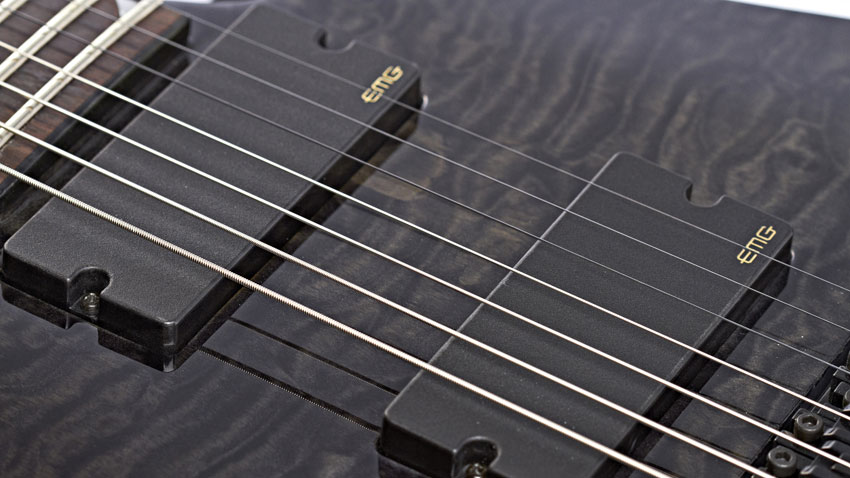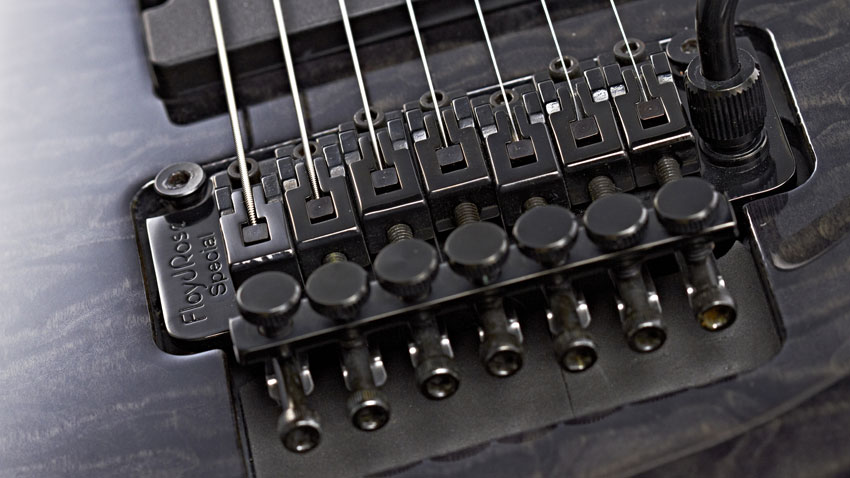MusicRadar Verdict
Is this Soloist better than its rivals? In some ways, yes: the EMGs give it the edge, sonically, but we're calling it a draw and declaring the seven-string arms race a victory for players whose needs exceed those offered by puny six-string electrics.
Pros
- +
Classy looks. Brilliant neck. Great tones and low-end definition.
Cons
- -
Floyd Rose Special bridge doesn't quite compete with rival models.
MusicRadar's got your back

Jackson SLATXMGQ3-7 Soloist

Pickups

Bridge
Jackson has never been shy when weaponising the electric guitar for metal guitarists. It's not just that this X-Series Soloist's headstock looks viscera-troubling, it's the spec: solid mahogany with quilted maple veneer; a double-locking Floyd Rose Special vibrato unit; a three-piece through-body neck; active EMG-707 pickups; and, of course, seven shreddable strings.
It's a sign of the times that you can get all this for less than a grand. Just as Ibanez did with its Premium Series, Jackson's X Series is constructed in Indonesia - but surely only case-sniffers would balk at this Soloist's origin.
"Ibanez provides the yardstick by which the Soloist will be measured, in the comparatively spec'd RG Premium Series"
Ibanez provides the yardstick by which the Soloist will be measured, in the comparatively spec'd RG Premium Series. The Trans-Black Soloist TG was privy to has an understated class about it.
With minimalist fret markers, black-on-black binding on headstock and neck, plus black hardware, it looks like an oversized Soloist in stealth mode. But there's nothing stealthy about the sound.
Seven-string guitars have been popular since 1990, when Steve Vai and Ibanez sat down over tea and developed the Universe. At first, they were seen as gimmicky playgrounds for shredders whose free-range fingers needed more room to cut loose (see Vai, Steven Siro).
The nu-metal explosion did nothing to max out their cool points, either, but today's hi-tech metal crowd consider seven-strings essential, and that's what it comes down to: finding the right guitar is about assessing your needs.
"If your modus operandi involves tuning down to B or lower, playing mental riffs, engaging in whammy bar abuse and super-fast lead playing, you need this guitar"
If your modus operandi involves tuning down to B or lower, playing mental riffs, engaging in whammy bar abuse and super-fast lead playing, you need this guitar.
Want all the hottest music and gear news, reviews, deals, features and more, direct to your inbox? Sign up here.
All seven-stringers take some time to get used to, but Jackson has made it easy. The 305 to 406mm (12- to 16-inch) compound radius neck will never be the most comfortable, but it's so fast it's ridiculous.
Even before plugging in, this Soloist, with its pretty-much-perfect upper-fret access, will make you feel like a better player. It'll make you sound like one, too.
Clean tones are great: warm and precise on the neck pickup, and sharp and gnarly on the bridge. But the Soloist excels in handling high-gain riffs. The definition when playing low-end licks is outstanding; even during the busiest riffs the Soloist never loses its voice in the mud, and that voice is warm and aggressive.
The Floyd Rose Special doesn't have the wow factor of Ibanez's Edge-Zero II with Zero-Point System, but it's stable enough for show-pony squeals.
Jonathan Horsley has been writing about guitars and guitar culture since 2005, playing them since 1990, and regularly contributes to MusicRadar, Total Guitar and Guitar World. He uses Jazz III nylon picks, 10s during the week, 9s at the weekend, and shamefully still struggles with rhythm figure one of Van Halen’s Panama.
